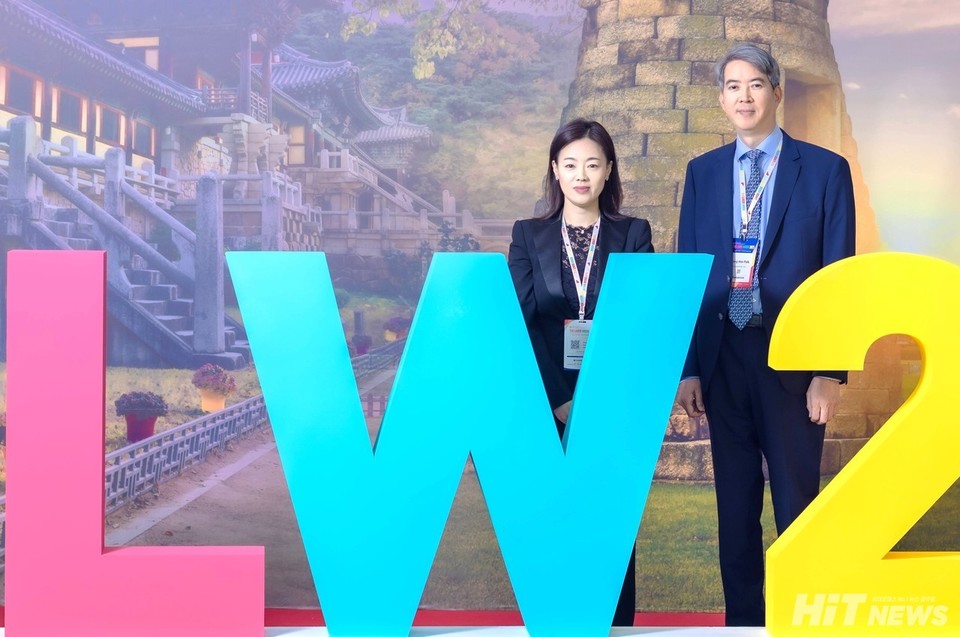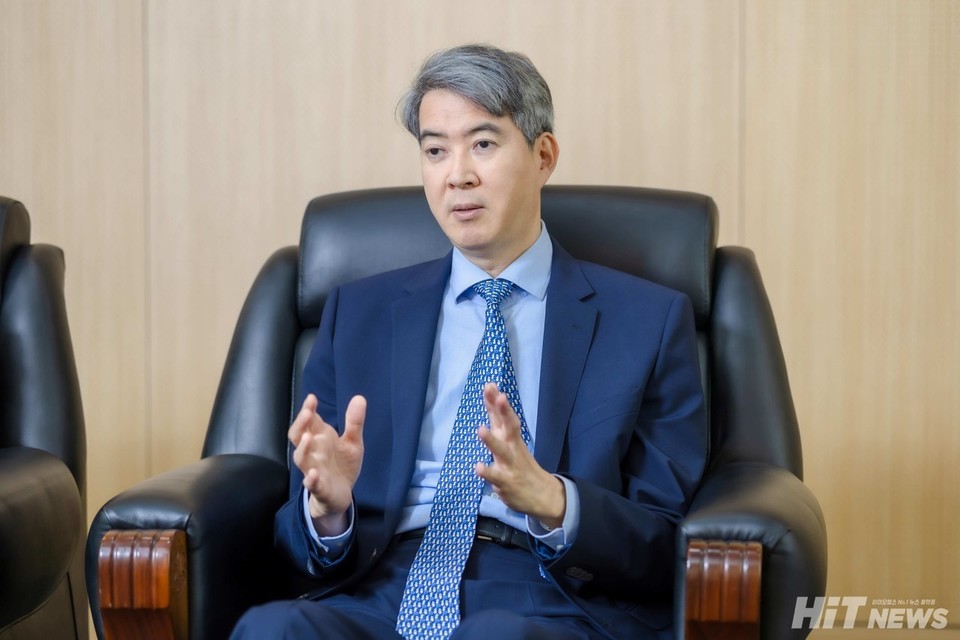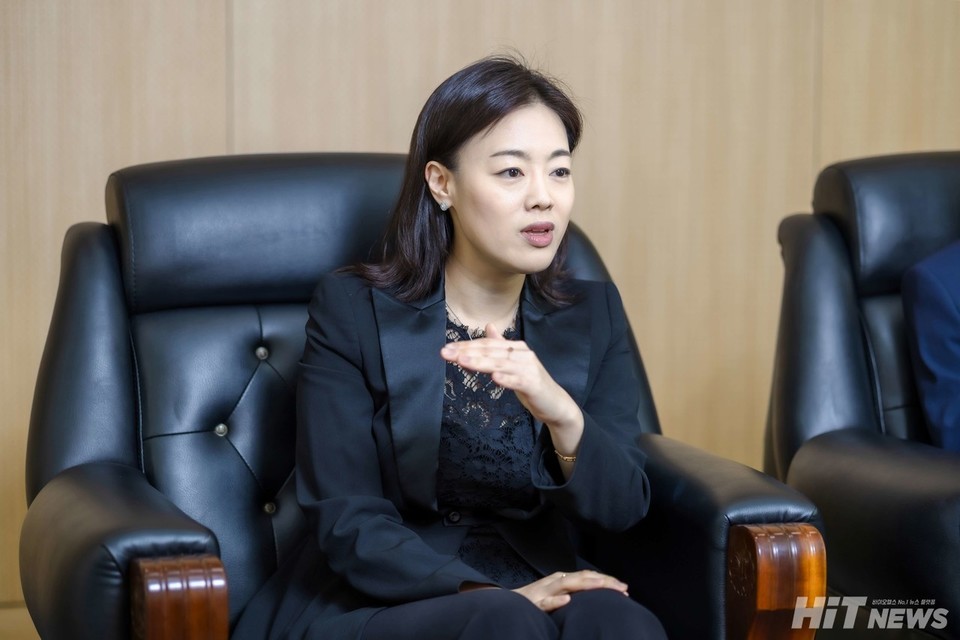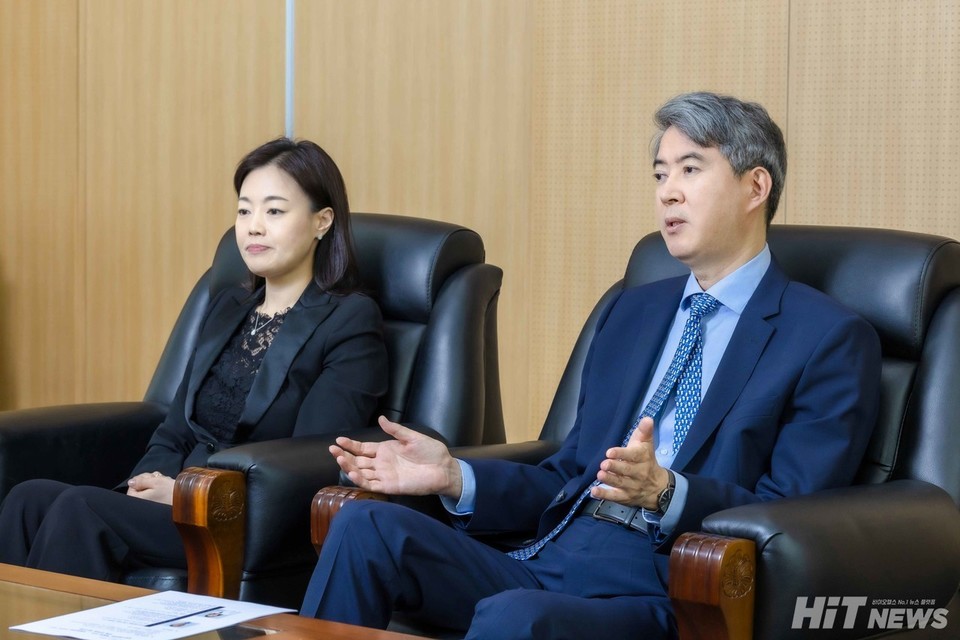HITerview: Prof. Yonghan Baek and Prof. Yuri Cho
"STRIDE maintains liver function even in high-risk patients"
"Fewer side effects enable safe use in elderly patients"
The combination immunotherapy regimen of Imfinzi (durvalumab) and Imjudo (tremelimumab), known as the STRIDE regimen, is drawing increasing attention for its potential to improve long-term survival and maintain quality of life in patients with hepatocellular carcinoma (HCC) and impaired liver function.
Liver cancer is the second leading cause of cancer-related deaths in Korea, often associated with chronic hepatitis B or C, which raises the risk of hepatic dysfunction. For patients with advanced or unresectable HCC, declining liver function remains a major barrier to treatment, limiting therapeutic options and complicating disease management. As such, clinical priorities have shifted toward enhancing survival while preserving liver function.
Traditional targeted therapies are often linked to side effects like variceal bleeding and worsening liver function, creating an unmet need for safer alternatives. In this context, STRIDE has emerged as a promising option.
In the Phase 3 HIMALAYA trial, STRIDE was the first regimen to demonstrate the potential for 5-year survival in unresectable HCC. At 60 months, overall survival (OS) was 19.6%, more than double that of sorafenib (9.4%). Liver function remained stable throughout treatment, with favorable Child-Pugh and ALBI scores, and a marked reduction in variceal complications.
These outcomes have led to STRIDE's inclusion as a first-line standard therapy in the U.S. National Comprehensive Cancer Network (NCCN) guidelines and an ‘A1’ grade recommendation in the Korean Liver Cancer Association’s HCC treatment guidelines.
At Liver Week 2025 in Gyeongju, HIT News interviewed Professor Yonghan Baek of Samsung Medical Center and Professor Yuri Cho of the National Cancer Center, who shared clinical insights and experiences with STRIDE in Korean patients.

Liver function impairment is reported in the majority of liver cancer patients. Why is liver function so critical in the treatment of liver cancer?

"Preserving liver function in liver cancer patients is just as important as achieving therapeutic efficacy. When liver function is compromised, patients often struggle to benefit from anticancer treatments and, in many cases, are unable to continue therapy at all.
Approximately 70–80% of liver cancer patients also suffer from cirrhosis. As the disease progresses, liver function inevitably deteriorates. Therefore, before initiating treatment, key indicators of liver function—such as the Child-Pugh classification and Albumin-Bilirubin (ALBI) score—must be assessed to determine whether treatment is viable. Even if a drug shows some efficacy, patients with Child-Pugh B or C liver function often cannot tolerate the associated toxicity and side effects.
Moreover, maintaining stable liver function is essential for pursuing subsequent lines of therapy. If liver function deteriorates during first-line treatment, patients may lose the opportunity to receive further therapy altogether. Conversely, patients who manage to maintain liver function are more likely to benefit from future therapeutic options, including newly developed drugs."
There has been growing interest in immunotherapy-based research recently. Is there a particular reason this has become a trend?

"The main reason is that targeted therapies alone have shown limitations in improving overall survival (OS). The introduction of immunotherapies has brought a new treatment paradigm to liver cancer—similar to trends seen in other cancer types.
In Korea, the health insurance reimbursement system also plays a significant role.
Unlike other countries, treatment choices in Korea are heavily influenced by reimbursement criteria. For instance, if patients receive the targeted therapy lenvatinib (original brand: Lenvima) as first-line treatment and sorafenib (original brand: Nexavar) as second-line treatment under reimbursement, they are only eligible to access combination immunotherapies like Opdivo (nivolumab) and Yervoy (ipilimumab) as non-reimbursed options after those regimens fail.
Due to such constraints, there is a tendency to prioritize immunotherapy-based regimens as first-line treatment. In contrast, some countries still use immunotherapy in second-line or later settings.
In response, Korea's hepatocellular carcinoma treatment guidelines are now undergoing a revision process—the first update in four years since 2022. These guidelines, initially developed by the Korean Liver Cancer Association and the National Cancer Center in 2014, are revised every four years. I am currently serving as the lead secretary for the latest revision.
As part of the update, we plan to conduct a meta-analysis covering all systemic therapies used in second-line settings. A draft abstract is scheduled for release later this year, and the final version of the updated guidelines is expected to be published around June 2026."
A patient case involving the STRIDE regimen is set to be presented at this event. In your view, what is the most significant differentiator of the STRIDE regimen?
Professor Yuri Cho "Now that liver cancer treatment has entered the era of immunotherapy, the availability of another major first-line option besides the atezolizumab + bevacizumab combination is highly meaningful.
Unlike the atezolizumab + bevacizumab regimen, which combines an immunotherapy and a targeted therapy, the STRIDE regimen uses two immunotherapies. This has been associated with fewer variceal bleeding-related side effects and better overall tolerability.
At this presentation, I will highlight STRIDE’s ability to preserve liver function as well as its long-term survival benefit, as demonstrated in the 5-year follow-up of the HIMALAYA trial. I also plan to share a real-world case of a patient with poor liver function who achieved near-complete response (CR) after treatment with STRIDE.
This patient had Child-Pugh class B liver function at the start of treatment but showed no further deterioration and has now been stably maintained on therapy for over 6–7 months. This case illustrates that STRIDE can offer effective treatment without placing excessive strain on liver function.
Additionally, STRIDE is well tolerated by elderly patients. In contrast, older patients receiving oral targeted therapies often experience Grade 3 or higher adverse events, such as severe skin or systemic toxicity, leading to treatment discontinuation.
With STRIDE, if no severe immune-related adverse events occur early in treatment, patients are likely to continue therapy without major issues. In fact, many patients in their 70s and 80s have tolerated the regimen well."
Professor Yonghan Baek "Personally, my experience prescribing STRIDE is still limited, as it is not yet reimbursed in Korea. However, based on my experience with atezolizumab + bevacizumab, I believe STRIDE offers a key advantage in reducing bleeding risk.
When choosing a therapy, both efficacy and safety profiles must be considered. Bevacizumab is known to carry risks of bleeding, perforation, and ulcers. Many liver cancer patients already have underlying cirrhosis, and as the disease progresses, portal hypertension often leads to variceal bleeding—even if none is present initially.
Another important factor is the development of anti-drug antibodies (ADAs). These are proteins produced by the immune system in response to a drug it recognizes as foreign, potentially neutralizing the drug's effects. Notably, atezolizumab has shown a relatively high incidence of ADA formation.
According to research by Professor Hongjae Chun of CHA Bundang Medical Center, early formation of ADAs can reduce the efficacy of the atezolizumab + bevacizumab regimen. In contrast, STRIDE has shown a lower incidence of ADAs, which is a significant advantage."
Despite its many advantages, the STRIDE regimen has yet to be reimbursed in Korea. Do you have a message for health insurance authorities on this matter?

Professor Yonghan Baek "The Korean Association for the Study of the Liver (KASL) also recognizes the need for reimbursement of the STRIDE regimen and has submitted an official opinion to the Health Insurance Review and Assessment Service (HIRA) requesting coverage. We hope the administrative process moves swiftly so that reimbursement can be granted soon.
We understand that with limited healthcare budgets, covering high-cost novel therapies is a complex issue. However, STRIDE is backed by strong clinical evidence and provides clear health benefits to patients. For that reason, I believe reimbursement should be expedited. Korean patients should not face delays in accessing the latest therapies compared to those in other countries."
Professor Yuri Cho "Currently, STRIDE is often considered as an alternative for patients with private insurance or those at high risk of bleeding. If it becomes reimbursed in the future, more patients could benefit from its long-term treatment outcomes. It would be especially valuable for elderly patients.
Enhancing patient survival and contributing to public health is a responsibility shared by both national institutions and medical professionals. When a first-line treatment like STRIDE offers clear clinical benefits, I firmly believe it deserves to be covered by insurance."
Do you have any words of encouragement or advice for liver cancer patients and their caregivers in Korea?
Professor Yuri Cho "With the advent of the immunotherapy era, liver cancer patients can now maintain better overall health during treatment and experience fewer side effects.
Compared to the previous standard treatment, sorafenib, response rates have improved significantly while adverse events have decreased. I hope patients won’t approach treatment with fear or anxiety about side effects from the outset. Although rare, cases of complete response (CR) have been reported, so I strongly encourage patients to stay hopeful and remain committed to their treatment until the end."
Professor Yonghan Baek "There are two key messages I’d like to share. First, individuals in high-risk groups for liver cancer—including those with chronic hepatitis B or C, cirrhosis, or a family history—should undergo liver ultrasound screenings every six months.
Early detection through regular surveillance increases the likelihood of curative treatment. As the average age of liver cancer onset continues to rise, national cancer screening now provides semiannual monitoring for people in their 50s and also those in their 60s to 80s. I strongly encourage everyone to take full advantage of these programs.
Second, I urge patients to maintain open communication with their healthcare providers and trust their medical team throughout the course of treatment. Many patients diagnosed with advanced-stage or stage IV liver cancer often recall the severe side effects of older cytotoxic chemotherapies and become discouraged or consider giving up.
However, today’s immunotherapies have a much lower incidence of quality-of-life-limiting side effects such as hair loss or severe nausea. Some patients have even achieved complete remission. Please don’t lose hope—continue treatment with determination and confidence."

